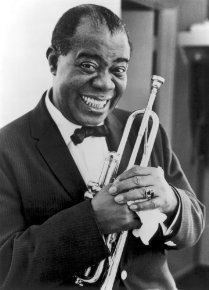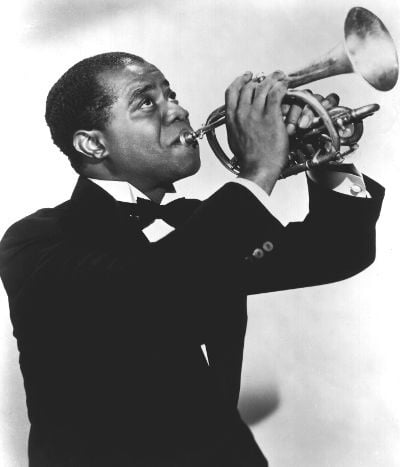 |
| (ThingLink ()) |
A man once said that "Music is the universal language of all mankind." The type of music people make and listen to gives one the idea of who they are as a person, for music is able to draw out emotion. The music that Louis Armstrong produced showed his joyous nature and would draw out happiness in people. He was born in poverty when the color barrier was still intact, but soon he broke the barrier and greatly improved the music category of jazz. Armstrong was able to rise to the top by setting out one goal, to make a living out of music. Due to this, he became a major musical force as an innovator, trumpeter, singer, and entertainer. Armstrong had a neglectful mother and father. His father abandoned Armstrong, leaving him with an irresponsible mother. Armstrong spent a lot of time caring for his mother and sister by singing in the street for pennies and working for a Jewish family who gave him enough money to buy his cornet. Growing up in New Orleans, he loved listening to the many brass bands. Soon Armstrong wanted to try music for himself, so he worked hard to buy a cornet.He shot a pistol into the sky in celebration of New Year's Eve, but a gun in the hands of a young African American is not something to be tolerated. As a result, Armstrong was immediately arrested.The court decided Armstrong's mother was not capable of raising him. Armstrong was then put in "Waif's Home for Orphans." Life looked gloomy for the youngster but he was given hope as he eventually developed his love for music. Day after day he would continuously practice his instrument, soon enough he became the leader of Waif's Band.Having practiced every night Armstrong learned at an astonishingly faster rate than his classmates. Soon he was given the opportunity to work with legendary performers such as Joseph Oliver, and Kid Ory which made his reputation skyrocket in the music community. In his later life, he endured hardships such racism and manipulation from his managers. He was able to overcome these complications because all he wanted to do was entertain his audience. A hero is a role model who possesses noble qualities such a dedication. This describes Louis Armstrong because no matter how badly the situation was, he found a way to keep entertaining his audience. Louis Armstrong deserves to be called a hero because of his dedication towards improving his musical skills, and his positivity which allowed him to triumph over poverty, racism, and almost single-handedly create a new form of music.
 |
| (AllMusic ()) |
Armstrong is considered a hero for all his devotion he put towards music. The amount of determination he put towards turning his musical skills into a career gave him the title of "The King of Jazz." When Armstrong was in Waif's Home he was invited to join the band. He rented a cornet and would practice every night, eventually making him the best musician in the band. Armstrong's release from Waif's Home left him depressed, as he had no cornet of his own. Armstrong convinced himself that he was destined to play music and he couldn't possibly go on without his cornet. In his late teens, Armstrong would haunt the nightspots in the evenings, absorbing the styles of the different bands. While Armstrong was out people noticed him as the leader of Waif's Band and would recruit him their band. "Occasionally he had a chance to perform, filling in for a missing player. "Run and get little Louie," the bandleader would say, and Louis would come running. He impressed people from the beginning, for he learned at an astonishing speed and could play anything he could whistle." (Louis Armstrong). Even though Armstrong no longer had a musical instrument he did not give up on his pursuit of a musical career. He already had somewhat of a reputation as the kid who was the leader of Waif's Band. Armstrong was so devoted to playing music that he would stay up every night studying music and listening to other musicians. After days upon days of practicing, his devotion finally paid off as he was recruited into Joe "King" Oliver's band. As a result, his career went way above what he expected it to become. Soon his reputation went from New Orleans to American, and soon all across Europe. Armstrong became a rising star in New Orleans. Bands from all over the city would recruit Armstrong to substitute one of their players. People from all over New Orleans would come to see the newfound young prodigy. One day as he was playing in a saloon the man who motivated him to go down this path, Joe Oliver came over to hear him play. Oliver was so impressed that he took Armstrong under his wing, and before long, he joined Oliver's band. Armstrong once said "Papa Joe Oliver, God bless him, was my man. I often did errands for Stella Oliver, his wife, and Joe would give me lessons for my pay. I could not have asked for anything I wanted more. It was my ambition to play as he did. I still think that if it had not been for Joe Oliver jazz would not be what it is today." (Tirro). Louis Armstrong found motivation to turn his musical skills into a career from Joe Oliver, who at the time was considered a jazz legend. As a result, he wanted nothing more but to play as good as he did. Since he was determined to become as good as Oliver, Armstrong went out of his way to get lessons from Oliver which shaped him into "The King of Jazz". Joe Oliver soon made Armstrong an official member of his band because he was impressed by the skills Armstrong developed at quite a young age. No matter how odd, Armstrong would work for the Oliver family so he could get lessons from Oliver. Overall Armstrong's dedication makes him a role-model for people because he found love for music and pressured himself into learning everything he could. Armstrong teaches people about setting goals for themselves, and with dedication, they can make what seems impossible come true.
 |
| (Louis Armstrong ()) |
Armstrong is also a hero for his positivity on-stage. The amount of happiness and energy in his songs influenced other musicians. People found Armstrong's passion as a sign that they too have the creativity and talent to produce beautiful music. In 1933 Armstrong's career started to fall apart, Armstrong was deeply in debt to the U.S government, members of his band, and his wife. His managers took advantage of his need for money and scheduled far too many appearances too close together. As a result, Armstrong tore his lip. Armstrong fired his manager to hire somebody, who would help him connect to his audience more, considering he could still sing. "He hooked up with a hard-driving, well-connected agent, Joe Glaser, who told Armstrong to smile and to use facial expressions to connect with audiences. While there were some who objected to his "jolly darkie" routine, those who were acquainted with Armstrong personally agreed that his onstage antics reflected his naturally joyous personality." (Armstrong First Records With His Hot Five Group). When Armstrong's lip tore up, his instrumental skills declined, but his singing was unharmed. He wanted to connect to the audience and make them have more appreciation for music. Luckily Armstrong found a manager who helped him bring out his joyful attitude. Yet again Armstrong became a hit due to the joy he brought to those who partook in his appearances. The sound of emotion that expressed to his audiences encourages people to be creative and enjoy music. Armstrong added in his own twist on his music. He would go off the sheet and add his own parts in to give audiences a sense of the same songs being new again. Louis was often asked what he thought about when he improvised, and he said "As soon as I close my eyes," he said, "I start to recall the wonderful times in my childhood and the music just starts to flow. To me, jazz is a kind of happiness. You have to love it to play it." (James) Armstrong inspired everyone that they could become a star like him with a good attitude and hard work. Even though Armstrong went through a lot of tough times as a kid he found enjoyment out of music. Armstrong is a great example for people developing in life. One must find something that they enjoy to prevail in life. Armstrong should be considered a hero for his positivity. He tries to bring out the most amount of joy in people by interacting with them during shows. He tells people to work hard and to have fun with their life. Even after death he still remains a role-model for all musicians who aim to go down the same path as Armstrong. The way Armstrong played, it was almost like he was one with the music. Whenever people listened to him play they always felt joy and exhilaration from his jolly songs. No matter how many times he was backstabbed or hated on, Armstrong didn't care. All he wanted was to entertain his audience.
Armstrong truly deserves to be called a hero due to how much of an inspiration he is. He greatly impacted the world of jazz music with his dedication and joyous traits. As he once said, "If you have to ask what jazz is, you'll never know"(Evans), meaning that jazz is something one must find out for themselves. In order to know what jazz is, one must feel it instead of asking for the meaning. Armstrong started as some kid who was just another poor negro and soon became an unstoppable powerhouse of music. Some people would say life is cruel and unforgiving, but Armstrong would respond with "see what a wonderful world it would be if only we'd give it a chance. Love, baby - love. That's the secret." (James). Armstrong influences people to give life a chance even though it has its painful moments.For if one looks at the world negatively then there is no purpose to life. Armstrong did not let his inconveniences as a kid determine his perspective on the world. Armstrong started out as some kid off the street trying to make as much money as possible, but all he needed was some dedication to make a major contribution to the musical world. All of which has made him into a major musical force as an innovator, entertainer, and\ an all-around hero.
Works Cited
Ryan, James. "Louis Armstrong." Louis Armstrong, Sept. 2005, p. 1. EBSCOhost,
search.ebscohost.com/login.aspx?direct=true&db=b6h&AN=17935450&site=brc-live
Evans, Anne. "The boy from Perdido Street." Skipping Stones, Nov.-Dec. 2012, p. 8+. Research in
Context,
go.galegroup.com/ps/i.do?p=MSIC&sw=w&u=powa9245&v=2.1&id=GALE%7CA30800450
1&it=r&asid=82a3291254d1265ed188381611cfc43b. Accessed 11 May 2017.
Tirro, Frank. "Louis Armstrong." American National Biography, 10/1/2010, p. 1. EBSCOhost,
search.ebscohost.com/login.aspx?direct=true&db=b6h&AN=35193538&site=brc-llive
Page created on 5/26/2017 12:00:00 AM
Last edited 5/26/2017 12:00:00 AM
